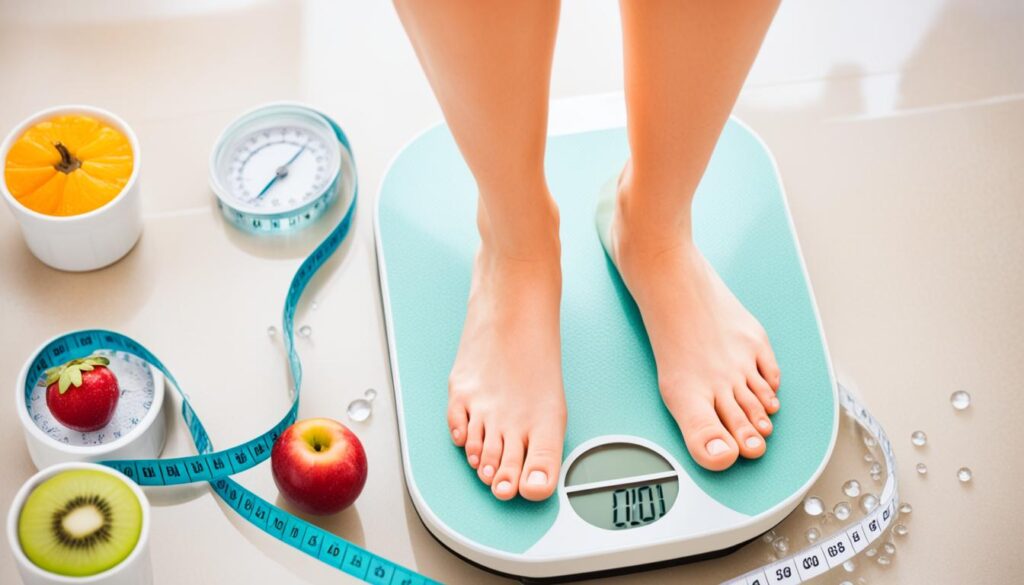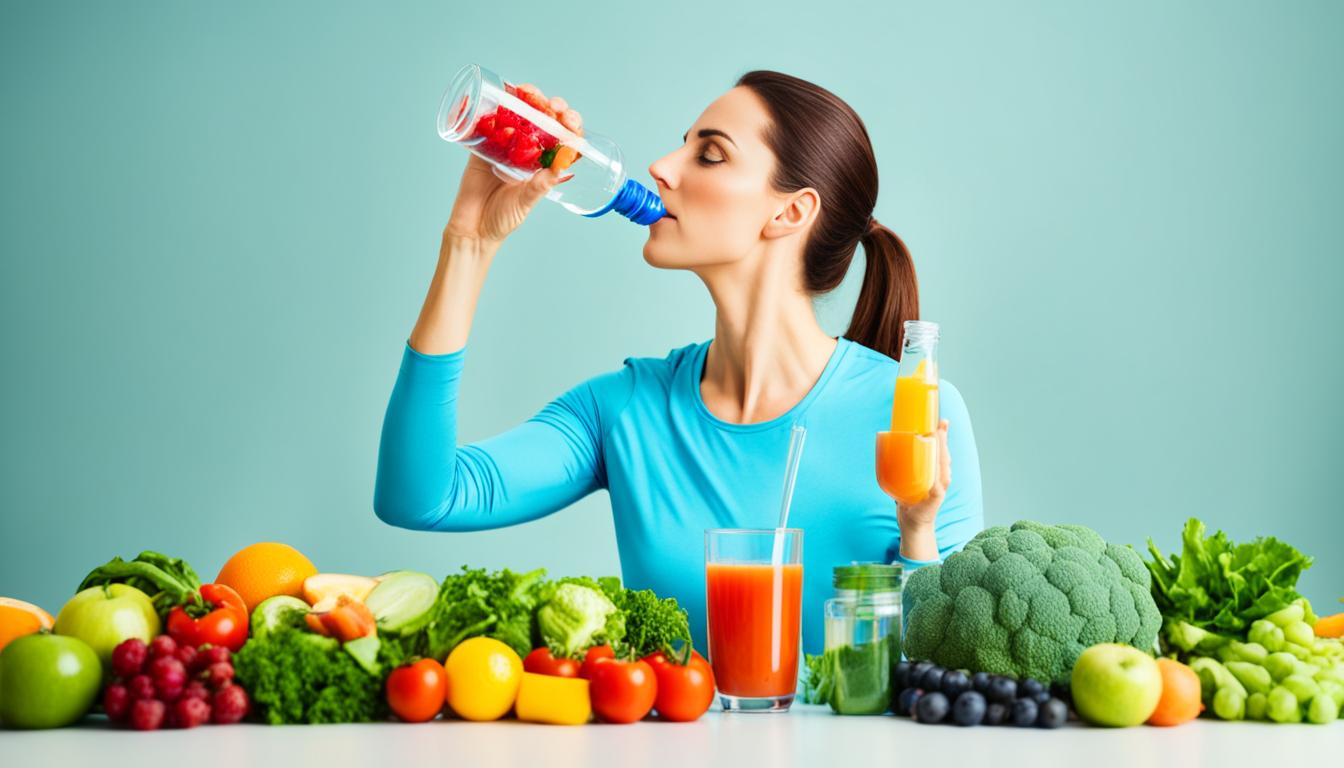Water is crucial for staying healthy. It helps our bodies in many ways. These include carrying nutrients to our cells and getting rid of waste. Water also protects our organs, makes joints smooth, and helps regulate body temperature. People in the US and Germany have different levels of hydration1. Since our bodies are mostly water, keeping hydrated is key for health. It keeps us well and helps us work as we should.
The Importance of Hydration for Good Health
Keeping yourself hydrated is crucial for many body functions. Water helps cells stay healthy, removes waste, and ensures our body works well. It’s vital for everyone, enhancing health and well-being.
Why Your Body Needs Water
Water is essential for almost everything your body does. It moves nutrients to cells and gets rid of waste. Water helps with joint movement, keeps you cool, and in older age, prevents over-drying without feeling thirsty1.
Health Benefits of Staying Hydrated
Drink to your health, literally. Staying hydrated boosts kidney function, sharpens your mind, and gives you more energy. It keeps your skin glowing, your tummy happy, and your metabolism running smoothly. And, it lowers the chance of kidney stones and UTIs.
Risks of Dehydration
The risks of dehydration are no joke, harming your body and mind. Not enough water can mess with your body’s cooling system, slow you down, and make you think less clearly1. Long-term dehydration can mess up your body’s salts and cause heat injuries. Kids who don’t drink enough may have trouble focusing. Watch out for early signs of dehydration like a dry mouth or feeling tired, and act fast to avoid serious problems.
Water Intake Benefits: How Much Should You Drink?
It’s important to know the *water intake benefits* for your health and how much you should drink. Your body’s need for water depends on many things. Let’s look closely at what affects this need.
Recommended Daily Water Intake
The average person’s body is mostly water, about 60%2. Drinking eight 8-ounce glasses, known as the 8×8 rule, is a common goal2. Yet, experts from the U.S. National Academies of Sciences, Engineering, and Medicine say men need about 15.5 cups and women need 11.5 cups of fluids daily3.
Factors Influencing Water Needs
Your water needs change with age, weight, how active you are, and the weather3. More water is needed when you exercise or it’s hot out3. Athletes might lose a lot of water through sweat, up to 10% of their body weight2.
So, it’s vital to stay hydrated to avoid dehydration. This ensures you can perform your best physically. The U.S. National Academies also recommend having water with meals and throughout the day to meet your fluid needs3.
Signs You’re Not Drinking Enough Water
It’s key to spot when you’re not drinking enough water. Even losing 1-3% of fluids can hurt your thinking and energy2. Dark urine and holding onto fluids are signs you might be dehydrated. Drinking more water can ease headaches, help with digestion, and prevent kidney stones2.
By understanding your water needs and the importance of staying hydrated, you can feel your best. Water doesn’t just help your body; it boosts your brain and mood too.
Water and Its Role in Metabolism
Water is key in how our bodies digest and absorb nutrients. It’s found that staying properly hydrated helps keep our metabolic rate healthy. A study in Spain linked drinking enough water to how well we eat and our hydration levels. This shows the close link between water and metabolism1. The National Academy of Medicine advises that men need about 13 cups of fluids daily. For women, it’s about 9 cups. This tells us just how vital water is for our metabolic health4.
Not drinking enough water can really mess up how our bodies function, leading to worse chronic diseases1. Our bodies need fluids to help with several processes. This includes moving vitamins and minerals from our food5. It’s been discovered that by drinking 500 milliliters of water, our metabolic rate can spike by 30 percent. This goes for both men and women. It clearly shows that more water means a faster metabolism5.
In older adults, not drinking enough water can make metabolism problems even worse1. Testing blood and urine for hydration levels helps us understand how not drinking enough water affects our body’s ability to stay in balance1.
The following table gives a brief idea of how much water people should drink daily:
| Population Group | Recommended Daily Water Intake (Cups) | Metabolic Benefits |
|---|---|---|
| Healthy Men | 13 | Maintains optimal metabolic rate and nutrient absorption4. |
| Healthy Women | 9 | Supports metabolic processes and prevents dehydration-related disruptions4. |
| Older Adults | Varies | Avoids hypertonicity and supports metabolic health1. |
| General Population | 8-12 | Improves metabolic rate by 30% when consuming 500 ml water5. |
The Role of Water in a Balanced Diet: Essential for Good Health
Water is key for a balanced diet. It’s about more than just drinking. It aids in nutrient absorption, boosts digestion, and keeps you healthy by adding water-rich foods to your meals.
How Water Supports Nutrient Absorption
Water is vital for making sure our bodies get the most from vitamins and minerals. It helps dissolve these nutrients, making them ready for use by our bodies. This way, essential functions are supported, keeping us healthy.
Hydration and Digestive Health
Good hydration is crucial for our guts. Drinking enough water keeps our digestive system working well. It stops constipation and helps us have smooth bathroom visits. This makes our gut feel and work better.
Water-Rich Foods to Include in Your Diet
Eating food high in water helps keep us hydrated. Think of watermelon, cucumbers, and strawberries. They’re not only tasty but also full of the nutrients our body needs to stay healthy. These foods help us absorb nutrients better and support good hydration16.

Water and Weight Loss: The Connection
Drinking water helps a lot with losing weight. It makes you feel full and boosts your body’s ability to burn calories. Research shows that drinking enough water every day can make you weigh less and have less body fat.
This part looks at how water is connected to losing weight. It also gives tips on the best ways to incorporate water into your weight management plan.

How Drinking Water Aids in Weight Loss
A key study included 50 overweight women for 8 weeks. They drank 500 mL of water before meals. This led to lower body weight, body fat, and BMI. It also made them less hungry7.
Another research looked at 12 people who drank 500 mL of water at different temperatures. They found burning 2-3% more calories after 90 minutes7. This is because water helps the body break down fat. The study also noted that people replacing sugary drinks with water lost more weight in a weight loss program7.
Best Practices for Using Water to Manage Weight
Using water to control weight requires a few habits. First, drink water regularly. This keeps you hydrated and helps burn calories. It’s very good to swap sugary drinks or alcohol for water. People who do this tend to lose more weight and have less obesity over time7.
Drinking water before eating makes you feel full. Thus, you eat less. A study found that doing so reduced BMI and the urge to eat more in overweight women7.
Impact of Hydration on Physical Performance
Drinking enough water is key for top physical performance, especially in sports. Studies show that water is vital for endurance and keeping body temperature stable during exercise. Dr. Samuel N. Cheuvront and team’s work points out how important it is to stay hydrated to keep your physical abilities high. Hydration also makes physical tasks seem easier, helping athletes stay in tiptop shape.
But, not drinking enough water can really hurt your performance. It lowers your endurance and makes you more likely to get sick from the heat. For instance, a study found that 52% of college football players got dehydrated during tough practices because they didn’t drink enough water1. It shows just how crucial it is to keep your water balance right, especially during long or intense workouts.
Even children can suffer if they don’t drink enough water. Research by Bar-David and others found that not drinking can affect how well school children can think and learn1. So, parents and teachers need to push for regular water breaks, especially in hot weather. This helps kids do better in both physical and mental activities.
Staying hydrated means drinking water all day, not just during workouts. The average daily water intake is about 3.18 liters for men and 2.5 liters for women in the United States, says Ershow and Cantor1. Drinking enough every day keeps you ready for any physical challenge. For further details, read Armstrong and his team’s in-depth study.
FAQ
Why is water essential for good health?
What are the key health benefits of drinking enough water?
What are the risks associated with dehydration?
How much water should one drink daily?
What factors influence an individual’s water needs?
How can you tell if you’re not drinking enough water?
How does water impact metabolism?
How does water support nutrient absorption?
What are some water-rich foods to include in your diet?
How does drinking water aid in weight loss?
What are some best practices for using water to manage your weight?
How does hydration impact physical performance?
Source Links
- https://www.ncbi.nlm.nih.gov/pmc/articles/PMC2908954/
- https://www.healthline.com/nutrition/7-health-benefits-of-water
- https://www.mayoclinic.org/healthy-lifestyle/nutrition-and-healthy-eating/in-depth/water/art-20044256
- https://nutritionsource.hsph.harvard.edu/water/
- https://www.healthline.com/health/food-nutrition/why-is-water-important
- https://www.mayoclinichealthsystem.org/hometown-health/speaking-of-health/water-essential-to-your-body-video
- https://www.medicalnewstoday.com/articles/322296




